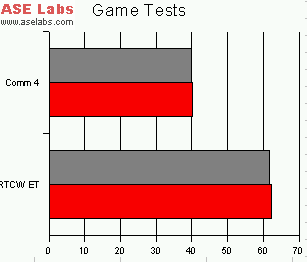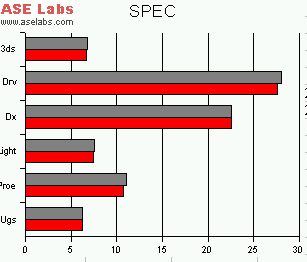Page All: Viewing All Pages
Page 1
<B>Intro</B>:
<center> </center>
</center>
The Springdale chipset has been out for some time now, and many board manufacturers have already started making different and varied boards based on the chipset. With Intel locking out PAT type tricks on the newer Springdales, better get a Springdale board fast. You'll be stuck buying Canterwoods soon. The Springdale is a great chipset, so lets see what the <a href="http://www.gigabyte.com.tw">Gigabyte</a> Springdale board has to offer.
<B>Gigabyte</B>:
<i>The success of Giga-Byte Technology has exceeded all expectations. With the commitment to upgrading the IT industry, Giga-Byte Technology built up a solid foundation upon the envisioned industry scale. These efforts have earned Giga-Byte Technology an eminent and widespread reputation, as well as the focus of attention and accomplishment around the world. With the respectable performance of motherboard business and global reputation along with worldwide brand awareness, Giga-Byte Technology is making steady progress to become one of the best total IT product providers in the world.</i> Taken from Gigabyte's Website. We shall see if the statement holds up.
<B>The Box</B>:
<center>
 </center>
</center>
Here we have the front and back of the box. The box is pretty nondescript on what product your actually getting other than the fact that it is a Springdale board (i865PE). The front and back details the features that the board has.
<B>Parts</B>:
<center> </center>
</center>
When you open the box, you are greeted with a quick start guide as shown above. It is full color and shows where stuff is on the board and general information about the board. This is much better than a manual alone for new users.
<center> </center>
</center>
Above are all the parts that came with the board. Included: Manuals and other documentation, the board, some Sata cables, IDE cables, USB, firewire, Audio extras, and a IO shield. The only thing that was missing from my box was the driver and software CD. This is a minor flaw for me, but for people that need it, it might be a major problem.
<B>The Board</B>:
<center> </center>
</center>
Here we see the board in its entirety. As you can see, the motherboard has Dual Bios technology which I'll get to later. You'll also notice that the board is colored... a bit too wacky for my tastes, but I don't care once it is in my system. I'm not one to really notice hardware once it is working. The board itself is pretty well organized, and looks nice and tightly packed.
<center> </center>
</center>
The above shows the CPU area. The extra large northbridge heatsink may block some large CPU heatsinks, but for most it should be a problem. The socket area is pretty clear other than that.
<center> </center>
</center>
Here is a close up of that Northbridge heatsink. I bet that is larger than most 486 CPU heatsinks. Times have surely changed.
<center> </center>
</center>
Here we have the memory and IDE area. The ATX power connector is just above the black floppy port, I guess that is a good enough location. You've got plenty of wires in that area anyway. You'll notice the two Sata connectors to the left as well. The southbridge is also right next to that.
<center> </center>
</center>
You get a total of 5 PCI and 1 AGP slot. The AGP slot is not the first slot on a case though, it is the second. There is one less PCI slot than normal. I don't know anyone that uses more than 3 PCI slots anyway.
<center> </center>
</center>
Here is a nice shot of the color coded Fpanel. Sometimes the colors don't match up, and sometimes the power connector is three pins instead of two. It always happens that way. Regardless, it is a nice touch.
<center> </center>
</center>
Here we see the ports of the board. You'll notice that the layout is not standard, hence the given IO Shield.
<center> </center>
</center>
And here are the extra things included. USB and Firewire and some Audio outputs. Good stuff.
<B>Intro</B>:
<center>
 </center>
</center>The Springdale chipset has been out for some time now, and many board manufacturers have already started making different and varied boards based on the chipset. With Intel locking out PAT type tricks on the newer Springdales, better get a Springdale board fast. You'll be stuck buying Canterwoods soon. The Springdale is a great chipset, so lets see what the <a href="http://www.gigabyte.com.tw">Gigabyte</a> Springdale board has to offer.
<B>Gigabyte</B>:
<i>The success of Giga-Byte Technology has exceeded all expectations. With the commitment to upgrading the IT industry, Giga-Byte Technology built up a solid foundation upon the envisioned industry scale. These efforts have earned Giga-Byte Technology an eminent and widespread reputation, as well as the focus of attention and accomplishment around the world. With the respectable performance of motherboard business and global reputation along with worldwide brand awareness, Giga-Byte Technology is making steady progress to become one of the best total IT product providers in the world.</i> Taken from Gigabyte's Website. We shall see if the statement holds up.
<B>The Box</B>:
<center>

 </center>
</center>Here we have the front and back of the box. The box is pretty nondescript on what product your actually getting other than the fact that it is a Springdale board (i865PE). The front and back details the features that the board has.
<B>Parts</B>:
<center>
 </center>
</center>When you open the box, you are greeted with a quick start guide as shown above. It is full color and shows where stuff is on the board and general information about the board. This is much better than a manual alone for new users.
<center>
 </center>
</center>Above are all the parts that came with the board. Included: Manuals and other documentation, the board, some Sata cables, IDE cables, USB, firewire, Audio extras, and a IO shield. The only thing that was missing from my box was the driver and software CD. This is a minor flaw for me, but for people that need it, it might be a major problem.
<B>The Board</B>:
<center>
 </center>
</center>Here we see the board in its entirety. As you can see, the motherboard has Dual Bios technology which I'll get to later. You'll also notice that the board is colored... a bit too wacky for my tastes, but I don't care once it is in my system. I'm not one to really notice hardware once it is working. The board itself is pretty well organized, and looks nice and tightly packed.
<center>
 </center>
</center>The above shows the CPU area. The extra large northbridge heatsink may block some large CPU heatsinks, but for most it should be a problem. The socket area is pretty clear other than that.
<center>
 </center>
</center>Here is a close up of that Northbridge heatsink. I bet that is larger than most 486 CPU heatsinks. Times have surely changed.
<center>
 </center>
</center>Here we have the memory and IDE area. The ATX power connector is just above the black floppy port, I guess that is a good enough location. You've got plenty of wires in that area anyway. You'll notice the two Sata connectors to the left as well. The southbridge is also right next to that.
<center>
 </center>
</center>You get a total of 5 PCI and 1 AGP slot. The AGP slot is not the first slot on a case though, it is the second. There is one less PCI slot than normal. I don't know anyone that uses more than 3 PCI slots anyway.
<center>
 </center>
</center>Here is a nice shot of the color coded Fpanel. Sometimes the colors don't match up, and sometimes the power connector is three pins instead of two. It always happens that way. Regardless, it is a nice touch.
<center>
 </center>
</center>Here we see the ports of the board. You'll notice that the layout is not standard, hence the given IO Shield.
<center>
 </center>
</center>And here are the extra things included. USB and Firewire and some Audio outputs. Good stuff.
Page 2
<B>BIOS</B>:
The BIOS of the board seemed lacking to me, until I pressed the cntl+F1 key at the main screen (not shown), this brings up the Advanced Chipset menu for changing the RAM settings. Why the option is hidden is beyond me.
<center> </center>
</center>
This is the screen you'll be greeted with if you don't press cntl+F1.
<center> </center>
</center>
You'll see no voltage readings here, just OK or Fail. The DDR Ram voltage is running out of spec (set by me). That is why it is Fail.
<center>


 </center>
</center>
Here we have the overclocking options. The problem is that the memory dividers are a bit lacking. If they made 1.5 dividers, then I could run at 250 Mhz FSB. Alas, it isn't. The other options are well enough. Not shown is the RAM settings screen, it gives you the normal options for Ram (Cas, Interleave, etc). Why the CPU voltage jumps from 1.6 to 1.68 is a mystery to me. Steady increases below that, but I just don't know.
<B>Testing</B>:
I tested this board against (you guessed it!) my Abit IS7-E (The E means cheap!). It is also a Springdale board and should give a nice comparison.
The testing setup is the same as the previous SiS 648FX board.
P4 2.4C Ghz
512MB Crucial PC3200
Leadtek FX5600
80GB WD HDD
44.03 nVidia
Latest Intel INF
All tests were run at 640x480 at the lowest detail setting if possible. Red is the Gigabyte board while Grey is the Abit.
<center> </center>
</center>
First up is 3D Mark 2001. We can see that the Abit board edges out, but statistically, this could be percent error factoring in.
<center> </center>
</center>
Next up is 3D Mark 2003. Seems the two boards are pretty much even still.
<center> </center>
</center>
In Commanche 4 and in RCTW: ET, the Gigabyte Springdale board edges past the Abit solution. Of course, this is statistically a tie as well.
<center> </center>
</center>
PC Mark scores are in favor of the Gigabyte board. Hands down, the Gigabyte is the winner by a hair.
<center> </center>
</center>
Sandra shows a different picture. The Gigabyte board loses in Ram performance, but wins in Hard Drive performance.
<center> </center>
</center>
With all the SPEC tests, the Abit board wins out by a hair.
<center> </center>
</center>
In Super Pi, both boards are exactly the same. There is no difference.
<B>What it means</B>...
A Springdale is a Springdale. You'll need to look at the features and price of a board instead of the performance alone.
<B>BIOS</B>:
The BIOS of the board seemed lacking to me, until I pressed the cntl+F1 key at the main screen (not shown), this brings up the Advanced Chipset menu for changing the RAM settings. Why the option is hidden is beyond me.
<center>
 </center>
</center>This is the screen you'll be greeted with if you don't press cntl+F1.
<center>
 </center>
</center>You'll see no voltage readings here, just OK or Fail. The DDR Ram voltage is running out of spec (set by me). That is why it is Fail.
<center>



 </center>
</center>Here we have the overclocking options. The problem is that the memory dividers are a bit lacking. If they made 1.5 dividers, then I could run at 250 Mhz FSB. Alas, it isn't. The other options are well enough. Not shown is the RAM settings screen, it gives you the normal options for Ram (Cas, Interleave, etc). Why the CPU voltage jumps from 1.6 to 1.68 is a mystery to me. Steady increases below that, but I just don't know.
<B>Testing</B>:
I tested this board against (you guessed it!) my Abit IS7-E (The E means cheap!). It is also a Springdale board and should give a nice comparison.
The testing setup is the same as the previous SiS 648FX board.
P4 2.4C Ghz
512MB Crucial PC3200
Leadtek FX5600
80GB WD HDD
44.03 nVidia
Latest Intel INF
All tests were run at 640x480 at the lowest detail setting if possible. Red is the Gigabyte board while Grey is the Abit.
<center>
 </center>
</center>First up is 3D Mark 2001. We can see that the Abit board edges out, but statistically, this could be percent error factoring in.
<center>
 </center>
</center>Next up is 3D Mark 2003. Seems the two boards are pretty much even still.
<center>
 </center>
</center>In Commanche 4 and in RCTW: ET, the Gigabyte Springdale board edges past the Abit solution. Of course, this is statistically a tie as well.
<center>
 </center>
</center>PC Mark scores are in favor of the Gigabyte board. Hands down, the Gigabyte is the winner by a hair.
<center>
 </center>
</center>Sandra shows a different picture. The Gigabyte board loses in Ram performance, but wins in Hard Drive performance.
<center>
 </center>
</center>With all the SPEC tests, the Abit board wins out by a hair.
<center>
 </center>
</center>In Super Pi, both boards are exactly the same. There is no difference.
<B>What it means</B>...
A Springdale is a Springdale. You'll need to look at the features and price of a board instead of the performance alone.
Page 3
<B>Overclocking</B>:
Like I said earlier, I almost reached 250Mhz, but was held back by my RAM. If there was a better divider, I could run at 250 or higher. I'm now hitting a wall at 240Mhz FSB.
<B>Other Things</B>:
@Bios and Dual Bios are neat features. @Bios is a Windows based BIOS flasher, and you won't need to worry about screwing up your BIOS flash. With Dual BIOS, you can mess up a flash and still be safe! Don't go trying to mess anything up on purpose though... Murphy's Law. The Easy Tune4 Software for easy overclocking was pretty cool, but gimicky. You're better off just setting the stuff in hardware. The software made my system crash a few times while it tried to find the highest speed possible. Also, there is no way to set dividers in Easy Tune.
<B>Conclusion</B>:
Priced <a href="http://www.dealtime.com/dt-app/SE/KW-gigabyte 8ipe1000 pro/FD-0/linkin_id-3002062/NS-1/GS.html">around $115</a>, the <a href="http://www.gigabyte.com.tw">Gigabyte</a> 8IPE1000 Pro is a bit at the higher end of the Springdale spectrum. You do get a bunch of nice things for the extra cash, and the Dual BIOS feature is a great thing to have. I'm sure the software bundle is good as well, but I didn't get anyway. Regardless, this is a perfectly fast and stable board, with some moderate overclocking features. I would recommend this to anyone needing a nice and stable board at stock speeds.
I'd like to thank Sam from <a href="http://www.gigabyte.com.tw">Gigabyte</a> for making this review possible.
<B>Overclocking</B>:
Like I said earlier, I almost reached 250Mhz, but was held back by my RAM. If there was a better divider, I could run at 250 or higher. I'm now hitting a wall at 240Mhz FSB.
<B>Other Things</B>:
@Bios and Dual Bios are neat features. @Bios is a Windows based BIOS flasher, and you won't need to worry about screwing up your BIOS flash. With Dual BIOS, you can mess up a flash and still be safe! Don't go trying to mess anything up on purpose though... Murphy's Law. The Easy Tune4 Software for easy overclocking was pretty cool, but gimicky. You're better off just setting the stuff in hardware. The software made my system crash a few times while it tried to find the highest speed possible. Also, there is no way to set dividers in Easy Tune.
<B>Conclusion</B>:
Priced <a href="http://www.dealtime.com/dt-app/SE/KW-gigabyte 8ipe1000 pro/FD-0/linkin_id-3002062/NS-1/GS.html">around $115</a>, the <a href="http://www.gigabyte.com.tw">Gigabyte</a> 8IPE1000 Pro is a bit at the higher end of the Springdale spectrum. You do get a bunch of nice things for the extra cash, and the Dual BIOS feature is a great thing to have. I'm sure the software bundle is good as well, but I didn't get anyway. Regardless, this is a perfectly fast and stable board, with some moderate overclocking features. I would recommend this to anyone needing a nice and stable board at stock speeds.
I'd like to thank Sam from <a href="http://www.gigabyte.com.tw">Gigabyte</a> for making this review possible.
